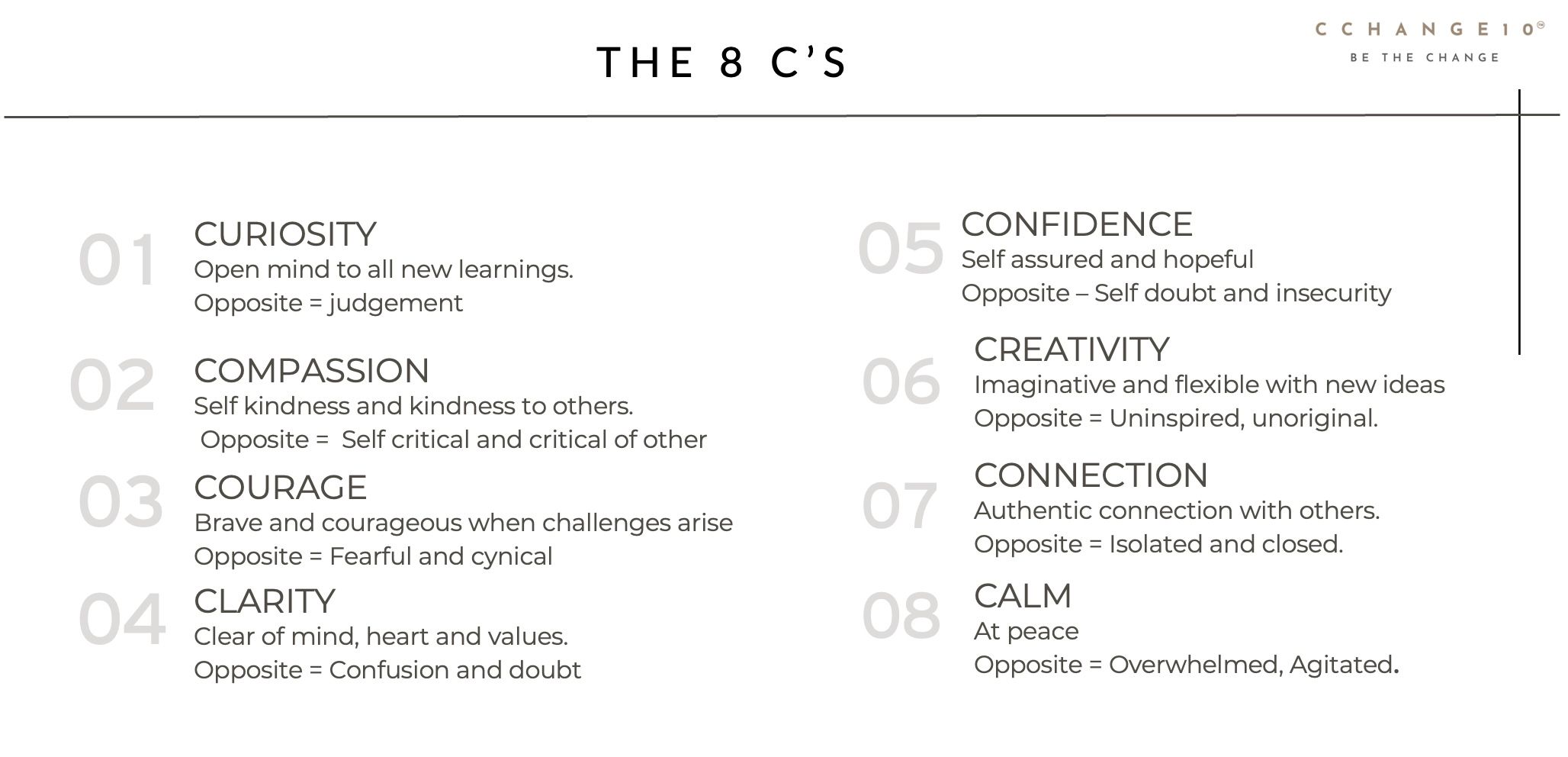The Eight C’s: My Favorite Tool
Jun 15, 2025
When we’re living a busy life, it’s easy to function on auto-pilot. We go through the motions, and in some cases, simply cope with life, instead of being fully immersed in, and enjoying the experience.
We can forget that life is something to be enjoyed and relished, not suffered through. But we get used to surviving, putting all our hopes and dreams on the back burner. We may believe that things will get better ‘one day’, or that this is simply our lot in life, but if we keep playing out the same old patterns, the likelihood is that one day will never come.
Living on auto-pilot simply means we don’t stop to explore what it is we’re actually doing and why. It’s like when we’re driving to a familiar place, we just get there, sometimes even when we don’t mean to!
Our brains are wired to follow familiar pathways to save energy. This is why doing what we’ve always done feels safe and efficient, even if it’s not what we ‘know’ is best for us.
If we want to relax or wind down, and we’ve used alcohol to do that for some years, then of course, as soon as we’re stressed, the brain identifies the quickest and most efficient way to get this result – and we pour a drink, despite any objections from the mind
So, if we’re wired to seek familiarity and comfort, why do we also have the sense that something needs to change? The annoying truth is that we have conflicting needs. The need for safety and familiarity, and the universal human need to grow and evolve.
Today I want to share a tool that has been extremely useful to me in navigating the process of change. It is a powerful but gentle approach to becoming more aware of our behaviours and the first step to taking conscious action to change or adapt things that might be getting in the way of our growth.
One of the best tools I have discovered is the framework of the Eight C’s of Self Energy ( listed above)
Developed by Dr. Richard Schwartz, the creator of Internal Family Systems (IFS), these eight qualities—Calm, Clarity, Curiosity, Compassion, Confidence, Courage, Creativity, and Connectedness—serve as sign-posts for times when we are feeling change is needed but we’re not sure why or how.
Many of us, particularly those working to remove or reduce alcohol, find that drinking provides escape from survival mode. It numbs and distracts, provides relief and reward, but the pay-off is often more intense, and less pleasurable! We find we can lose ourselves for a while, but when the effects wear off, we are faced with a self we don’t really want to be around.
We are trying to escape from or amplify our experiences, be ‘someone else’ for a while. And the more we drink, the stronger the habit becomes. We associate drinking with being more of, or less of who we truly are.
Does it means we don’t like, or feel comfortable with, being who we are?
This is where the 8 C’s come in.
The Power of the Eight C’s
Dr. Schwartz found that when people were connected to and speaking from a place of true self-awareness, they naturally displayed these eight qualities. He refers to this state as being ‘In Self’
He noticed that when people were not being ‘themselves’, when they were caught in their “parts”—the parts of them that binged, avoided, numbed, or judged—they lost these qualities. In those moments, they weren’t truly themselves.
Imagine this: You’re having a stressful day, and the thought of a drink enters your mind. But instead of defaulting to that old pattern, you pause and ask yourself,
Which of the Eight C’s do I need today?
Maybe it’s Curiosity—Why am I feeling this way? What am I really needing?
Maybe it’s Compassion—It’s okay to feel overwhelmed. What can I do to support myself?
One simple yet powerful practice is to pick one of these words each morning and let it be your guiding force for the day. When you feel discomfort creeping in, reconnect with your chosen word.
When We’re Not in Self
We all know what it feels like to be off. To say, “I’m not myself today.” When we are disconnected from Self, our thoughts can turn dark and self-defeating: I’m not enough. I can’t do this. They don’t like me. I’ll always fail.
This is where the work begins—recognizing when we’re out of alignment and gently guiding ourselves back.
Psychologist Dr. Dan Siegel describes something similar in his Window of Tolerance theory. He explains that when we are in our optimal state—our window of tolerance—we can respond to life calmly and effectively. But when we move outside of that window, we either become overstimulated and reactive (hyperarousal) or we shut down and withdraw (hypoarousal).
Hyperarousal might look like racing thoughts, anxiety, anger, or feeling out of control. Many people drink to escape this state. Hypoarousal, on the other hand, feels like numbness, disconnection, exhaustion—another state that often leads to reaching for alcohol.
Relearning How to Be Ourselves
For Grey Area Drinkers drinking becomes a tool to artificially shift our state—to numb, to quiet, to escape. But this is a short-lived transformation. True transformation comes when we learn to return to and stay with ourselves without alcohol.
When you’re in hyperarousal, the instinct might be to pour a drink to “take the edge off.” Instead, what if you practiced CURIOSITY and COURAGE? Pause and do some deep breathing, move your body, and remind yourself: I am in my hyper state. What do I really need right now?
When you’re in hypoarousal, you might long for something to wake you up or motivate you. Instead of alcohol, what if you focused on CREATIVITY AND COMPASSION, engage in something creative, call a friend, put on an inspirational audio book, or spend time in nature?
The Most Important C: Curiosity
One of the most powerful shifts you can make is replacing judgment with curiosity. When you feel the pull to drink, instead of thinking, Why am I so weak? try asking, What is this feeling trying to tell me? What do I truly need?
Curiosity leads to Compassion. And compassion leads to Confidence. This is the path back to Self.
The Truth About Self-Centeredness
A question that often arises in this work is: Am I being selfish? Many people fear that by focusing on their own healing, they are neglecting their relationships. But there is a key difference between being self-centered and being in Self.
When you are in true Self, you are not just thinking about yourself—you are thinking from yourself. You are calm, clear, and connected to those around you. True self-awareness actually allows for greater connection with others.
But when you are self-centered, you are acting from a place of lack, trying to fill an inner void. Drinking often falls into this category—it’s a way of trying to take care of yourself but in a way that ultimately disconnects you.
Your Stories Shape Your State
The way we think about ourselves and our world is deeply influenced by our emotional state. If you are in a state of fear or stress, your thoughts will reflect that: People are against me. No one understands me. I’m failing at everything.
But when you are in a state of Self, your thoughts shift: I can figure this out. I am capable. I am doing my best.
So here’s an exercise: Ask yourself, When I am in a hyperaroused state (stressed, anxious), what stories do I tell myself? When I am in a hypoaroused state (numb, disconnected), what stories do I tell myself?
Then ask: What would my true Self say instead? Accessing the 8’C’s will help you answer this question.
Final Thoughts
Everything we do in this journey—removing alcohol, doing the inner work—is ultimately about returning to ourselves. Because Self is where peace, clarity, and joy live. It’s where we make decisions that align with who we truly are.
So today, take a moment to pause. Pick one of the Eight C’s to carry with you. Check in with yourself. And most importantly, trust that your true Self is always there, waiting for you to come home.
With Courage,
Sarah Connelly



